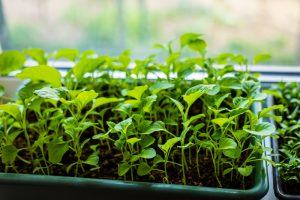
Eggplants are those purple-looking vegetables that we find in our gourmet cuisines. They originate from India, mainly from Assam and Burma. They are usually used in Italian, Indian and Asian foods. But here in the west, eggplants have become quite popular as well. Their popularity can be accredited to the many health benefits associated with the eggplant, plus its delicious flavor. Eggplants’ health benefits include antioxidant properties, lowered heart disease and maintaining blood sugar levels.
With such great taste and even better health benefits, it’s no surprise that now we are all trying to grow them in our backyards. Well, if you’re also like us, then you’ve come to the right place. This article will teach you how to plant eggplant seeds, care for the plant, and harvest the vegetable.
Let’s take a look at what’s needed to plant eggplant seeds.
Requirements For Eggplant Plantation

Soil: The soil for eggplant seeds should be rich and well-drained. Eggplants thrive in loamy soil, which is sandy soil. The pH for the soil can range from slightly acidic to slightly alkaline. A range of about 5.5-6.5 is ideal for eggplants. The soil should be well aerated and allow for proper water drainage
Fertilizer: You can use compost or a 5-10-10 fertilizer mixed into the soil. The eggplant plant needs to grow in rich fertile soil. If you use a water-soluble fertilizer, mix it in a watering can and sprinkle the soil. You can add to the soil and spread it with a spreader for granular fertilizer
Water: It is important to water the soil regularly because it needs to stay moist. You may also use mulch, e.g., straw or natural wood chips. You can cover the soil with mulch, which will help retain moisture in the soil and reduce the occurrence of weeds. Inconsistent watering of the plant may cause abnormal eggplant shapes, so water regularly. Ensure not to let the soil become waterlogged, which will harm the plant
Temperature: Eggplants need a temperature of 70 to 90 degrees Fahrenheit during the day and a nighttime temperature around 60 degrees Fahrenheit. These temperatures are ideal for optimum growth and to produce a healthy eggplant
Light: Eggplants love sunlight. It helps the plant grow faster and healthier. Make sure that your eggplant plants get six hours of direct sunlight
Now that we have the prerequisites down for planting eggplant seeds let’s look at how to go about it

Guide To Planting Eggplant Seeds
So there you go, a step-by-step guide from plantation to harvesting eggplants. Now let’s look at what kind of pests can be expected to cause your eggplants some problems.

Common Pests Infecting Eggplants
Eggplants are susceptible to fleas, beetles, tomato hornworms, and Colorado potato beetles. They are also susceptible to diseases like; verticillium wilt and powdery mildew. You can use mild pesticides to ward off the pests. But the best way to deal with the pests and disease issue is to keep your plant healthy, as they will be able to ward off pests and diseases on their own, also look for pest and disease-resistant varieties.
Conclusion
We hope this article was helpful to you in learning how to plant eggplant seeds. They are delicious vegetables with many health benefits. They are also one of the few vegetables that don’t require too much hassle when growing them. So why don’t you give it a try and grow some eggplant in your garden today?
Frequently Asked Questions
How long does it take to grow eggplant from seed?
Eggplants require a warm climate to grow well. If you live in a cold climate, it may be hard to grow them outdoors. They take anywhere between 70-90 days from seed planting to sprouting and then 90 days till harvest.
What is the best pH level for eggplant?
Eggplants do very well in soil that has a pH between 5.5-6.5.
Do you soak eggplant seeds before planting?
Many people do soak their eggplant seeds before planting them. It is advisable to soak the seeds in water overnight before sowing them into your garden.
What depth should I sow my eggplant seeds?
You need to make sure that you place the seed about 1 ¼” deep and cover it with soil. Water regularly, in the beginning, to allow the seed to germinate.






